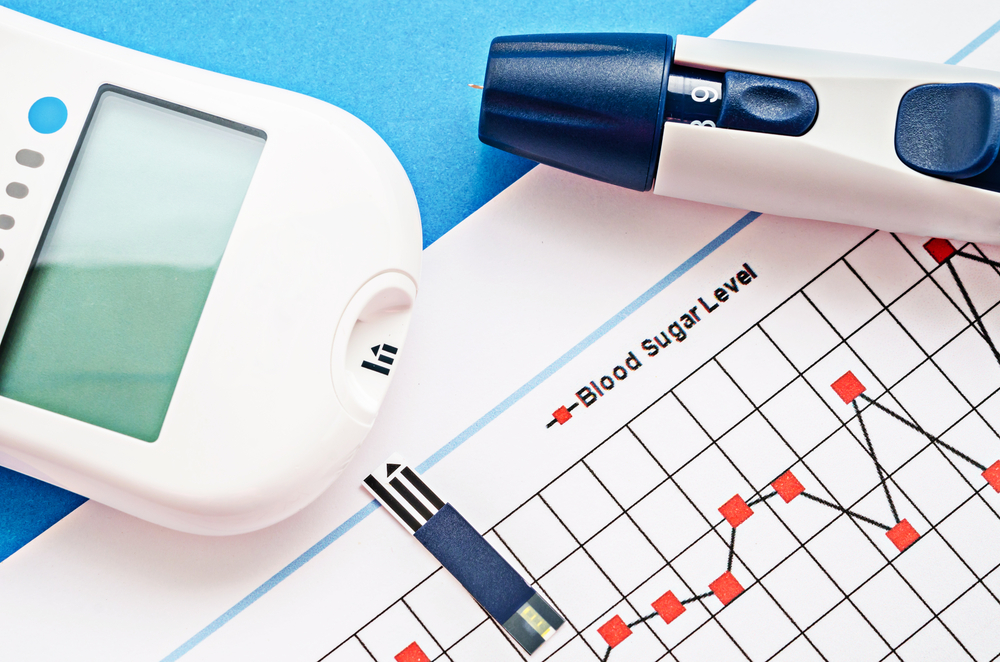There are two types of diabetes and both cause blood sugar levels in the body to rise to unhealthy levels.
Type 1 Diabetes (insulin dependent) is an autoimmune disorder. When your immune response is not functioning properly it attacks and destroys the healthy cells of the pancreas, where insulin (a hormone that plays a role in controlling blood sugar) is produced. This type usually develops in childhood and continues into adulthood, although there are unique situations when patients develop Type 1 Diabetes later in life.
Type 2 Diabetes (insulin resistant) is a metabolic disorder that occurs when the body does not process insulin correctly. This usually happens in fat, liver and muscle cells. While this type of diabetes is often associated with being overweight or obese, a person with any body type may end up with Type 2 Diabetes for other metabolic reasons.
Untreated diabetes can cause serious medical problems including kidney failure, vision loss, nerve damage, cardiovascular (heart and blood vessel) problems, and increases the risk of dementia. Additionally, the body’s immune system and healing response can be vulnerable and therefore leads to higher risks of serious infection. If diabetes related infections are not properly treated they may develop quickly and severely due to limited immune response caused by diabetes.
TREATMENT
While there is no cure for diabetes, symptoms can be managed with your doctor’s careful and ongoing medical care. Your doctor will want you to have routine office exams and testing. You will need to monitor your blood sugar frequently and may need to take insulin to help keep glucose levels within normal ranges.
Type 1:
Insulin is the most common treatment for Type 1 diabetes. Insulin is injected through the skin into the fatty tissue below. There are various ways of delivering insulin Injections and new ways of delivering this medication are constantly being researched. Currently, insulin is delivered through:
- syringes, into which insulin is drawn as it is for a vaccination or any typical injection
- insulin pens with fine needles that dispense pre-filled cartridges
- jet injectors using high pressure air sending a spray of insulin through the skin
- insulin pumps that dispense insulin through a flexible tube into a catheter under the skin of the abdomen (below the stomach).
Type 2:
Depending on the severity of the patient’s Type 2 Diabetes, it is treated with a combination of lifestyle changes and various medications. Some Type 2 Diabetes patients are able to treat their illness with diet and exercise alone.
Diet – Managing one’s weight is often a key ingredient in managing one’s blood sugar levels. Even a small weight loss can often make a significant change in a person’s blood sugar levels. Proper nutrition for a diabetic, such as limiting sugar intake and carbohydrates is typically the first recommended piece of the puzzle. Other nutritional factors, such as the intake of fiber, fat and salt also need to be discussed with your health care provider as they affect the way your body metabolizes food and nutrients, thus affecting your blood sugar levels.
Exercise – Research has shown that physical activity directly affects the level of sugar in the body. Those who are sedentary are encouraged to becoming more physically active, as it may also help control blood sugar as well as having the extra benefit of possible weight loss. In fact, diabetic patients who take a brief walk immediately after eating often find they are able to better control their body’s blood sugar levels.
Medication – There are a myriad of medications that treat Type 2 Diabetes. There are several major categories of medications for treating Type 2 Diabetes including:
- Metformin – Typically, metformin is the first medication prescribed for type 2 diabetes. It improves the sensitivity of your body tissues to insulin so that your body uses insulin more effectively and also lowers glucose production in the liver.
- Sulfonylureas – These medications help your body create more of its own insulin.
- Meglitinides – These are medications that work similarly to sulfonylureas. They are fast acting and stimulate the pancreas to secrete more insulin.
- Thiazolidinediones – Because they often are associated with some weight gain as a side effect, they are used a little less often, but these medications work similarly to metformin and help the body use insulin more effectively.
- DPP-4 inhibitors – Medications that tend to modestly reduce blood sugars.
- SGLT2 inhibitors – these are some of the newer diabetes drugs which work by preventing the kidneys from reabsorbing sugar into the blood and it is then excreted in the urine.
- Insulin therapy – Just as in Type 1 Diabetes, insulin must be injected, as digestion interferes with insulin absorption if it is taken orally. There are various types of insulin that act slightly differently; mostly in terms of how long or short their effect is in the body. Some patients take different types of insulin at different times of the day to control their blood sugars.

It can feel overwhelming to consider that you may have diabetes. The implications to your lifestyle and overall health can seem daunting.
We are here to help you. From diagnosis to treatment, you are not alone. Our team will work with you to help you manage the process and to feel your best.
TESTING AND PROCEDURE
In order to properly diagnose diabetes, your health care provider will order some tests. Much of the testing can be done right in our office.
There are various diagnostic tools your doctor may use to determine whether or not you have diabetes. Some of the common types of tests that might be performed include:
- Fasting plasma glucose test – this blood test measures your blood glucose after an extended period of fasting.
- Oral glucose tolerance test – this blood test measures your blood sugar after an extended period of fasting followed by drinking a special sweet fluid that has a high amount of glucose.
- Random plasma glucose test – is a blood test that your doctor uses to check your blood sugar that does not require fasting.
- Hemoglobin A1C – is a blood test that measures the average glucose level in your blood over a three-month period. This test gives the doctor a snapshot of how your blood sugars levels are and have been over time, which is beneficial to understanding your overall health picture.

